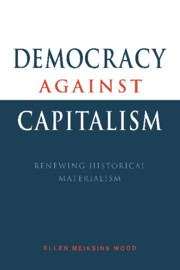Book contents
- Frontmatter
- Contents
- Acknowledgements
- Introduction
- I HISTORICAL MATERIALISM AND THE SPECIFICITY OF CAPITALISM
- II DEMOCRACY AGAINST CAPITALISM
- 6 Labour and democracy, ancient and modern
- 7 The demos versus ‘we, the people’: from ancient to modern conceptions of citizenship
- 8 Civil society and the politics of identity
- 9 Capitalism and human emancipation: race, gender and democracy
- Conclusion
- Index
7 - The demos versus ‘we, the people’: from ancient to modern conceptions of citizenship
Published online by Cambridge University Press: 13 October 2009
- Frontmatter
- Contents
- Acknowledgements
- Introduction
- I HISTORICAL MATERIALISM AND THE SPECIFICITY OF CAPITALISM
- II DEMOCRACY AGAINST CAPITALISM
- 6 Labour and democracy, ancient and modern
- 7 The demos versus ‘we, the people’: from ancient to modern conceptions of citizenship
- 8 Civil society and the politics of identity
- 9 Capitalism and human emancipation: race, gender and democracy
- Conclusion
- Index
Summary
The ancient concept of democracy grew out of a historical experience which had conferred a unique civic status on subordinate classes, creating in particular that unprecedented formation, the peasant citizen. In all – or at least a great deal – but name, the modern concept belongs to a different historical trajectory, most vividly exemplified in the Anglo-American tradition. The landmarks along the road to the ancient democracy, such as the reforms of Solon and Cleisthenes, represent pivotal moments in the elevation of the demos to citizenship. In the other history, originating not in Athenian democracy but in European feudalism and culminating in liberal capitalism, the major milestones, like Magna Carta and 1688, mark the ascent of the propertied classes. In this case, it is not a question of peasants liberating themselves from the political domination of their overlords but lords themselves asserting their independent powers against the claims of monarchy. This is the origin of modern constitutional principles, ideas of limited government, the separation of powers, and so on: principles which have displaced the social implications of ‘rule by the demos’ – such as the balance of power between rich and poor – as the central criterion of democracy. If the peasant-citizen is the most representative figure of the first historical drama, in the second it is the feudal baron and the Whig aristocrat.
- Type
- Chapter
- Information
- Democracy against CapitalismRenewing Historical Materialism, pp. 204 - 237Publisher: Cambridge University PressPrint publication year: 1995
- 4
- Cited by



